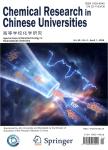A Three-drug co-Delivery System Based on Reduction-sensitive Polymeric Prodrug to Effectively Reverse Multi-drug Resistance
A Three-drug co-Delivery System Based on Reduction-sensitive Polymeric Prodrug to Effectively Reverse Multi-drug Resistance作者机构:Key Laboratory of Biomedical Polymers Ministry of Education College of Chemistry and Molecular Sciences Wuhan University Wuhan 430072 P. R. China
出 版 物:《Chemical Research in Chinese Universities》 (高等学校化学研究(英文版))
年 卷 期:2017年第33卷第3期
页 面:484-491页
核心收录:
学科分类:0710[理学-生物学] 071010[理学-生物化学与分子生物学] 081704[工学-应用化学] 0907[农学-林学] 07[理学] 08[工学] 0817[工学-化学工程与技术] 0829[工学-林业工程] 09[农学]
基 金:Supported by the National Natural Science Foundation of China(No.21374082)
主 题:Multi-drug resistance co-Delivery Polymersome Multi-drug resistance co-Delivery Polymersome
摘 要:In the present study, we prepared a multi-drug delivery system based on reduction-sensitive paclitaxel (PTX) polymeric prodrug(PEG-b-PMPMC-g-PTX, PMP) polymersomes to co-deliver PTX, doxorubicin hydrochlo- ride(***1) and the P-glycoprotein(P-gp) inhibitor Tariquidar(TQR) to effectively reverse drug resistance by inhibiting the expression of P-gp and improving the accumulation of the encapsulated anticancer drugs. The PTX was linked to the backbone by reduction-sensitive disulphide, making the polymersomes prone to collapse in the reductive environment and to release the drugs. Transmission electron microscope(TEM) was used to confirm the morphology of polymeric assemblies. Moreover, the rupture process of polymersomes was verified by dynamic light scattering (DLS). The results of confocal laser scanning microscopy(CLSM) and flow cytometry indicate that the PMP/***/TQR three-drug-loaded polymersomes show the strongest fluorescence intensity for DOX-HC1 compared with PMP/DOX-HC1 polymersomes and free DOX-HCl in drug-resistant MCF-7/ADR cells. More importantly, the PMP/***/TQR multi-drug co-delivery system shows a greater growth-inhibitory effect on tumour cells than the other two samples, including PMP/***1 nanoparticles without the TQR component and free DOX-HCl, when co-incubated with either nonresistant HeLa cells or drug-resistant MCF-7/ADR cells. This growth-inhibitory effect was especially evident in drug-resistant cells. These results imply that the co-delivery of PTX, DOX-HCl and TQR based on reduction-sensitive polymeric prodrug may be promising for overcoming multi-drug resistance in tumour treatments.



